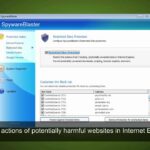
1. Stay vigilant when clicking on unknown links
Existen numerosas amenazas en línea que pueden poner en riesgo tu privacidad y seguridad en la web. Una de las principales formas en que los ciberdelincuentes tratan de obtener acceso a tu información personal es a través de enlaces desconocidos. Por lo tanto, es crucial mantenernos alerta y vigilantes al hacer clic en enlaces que no conocemos.
Cuando navegas por internet, es común encontrarte con enlaces en correos electrónicos, mensajes de texto o incluso en redes sociales. Sin embargo, no todos los enlaces son seguros. Algunos pueden llevar a páginas fraudulentas o contener malware que puede dañar tu dispositivo o robar tu información personal.
Por esta razón, es esencial tener precaución al hacer clic en enlaces desconocidos. Antes de hacerlo, asegúrate de verificar la fuente y la autenticidad del enlace. Si recibes un correo electrónico sospechoso o un mensaje que contiene un enlace, evita hacer clic directamente y en su lugar, abre una nueva pestaña en tu navegador y busca la página o servicio por tu cuenta.
Además, es recomendable tener instalada una herramienta de seguridad en tu dispositivo que te ayude a identificar enlaces maliciosos. Algunos navegadores y programas antivirus ofrecen protección adicional contra enlaces dañinos, lo que puede ayudarte a evitar caer en trampas en línea.
En resumen, mantenernos alerta y ser cautelosos al hacer clic en enlaces desconocidos es fundamental para proteger nuestra seguridad y privacidad en línea. Tomar estas precauciones simples, como verificar la fuente y la autenticidad del enlace, así como tener instalada una herramienta de seguridad confiable, nos ayuda a evitar caer en las trampas de los ciberdelincuentes y disfrutar de una experiencia en línea segura.
2. Keep your software and devices up to date
🔒
Keeping your software and devices up to date is crucial in today’s digital landscape. As technology advances, so do the potential risks and vulnerabilities. By regularly updating your software and devices, you can ensure that you are equipped with the latest security patches and bug fixes, providing a strong defense against cyber threats.
One of the main reasons for updating your software and devices is to protect yourself from malware and viruses. Hackers are constantly developing new ways to exploit vulnerabilities in outdated software, compromising your personal information and privacy. By updating regularly, you can stay one step ahead and minimize the risk of falling victim to these malicious attacks.
In addition to security benefits, updating your software and devices also brings performance improvements and new features. Developers often release updates to address issues and enhance user experience. By staying up to date, you can take advantage of these improvements and enjoy a smoother and more efficient user experience.
It’s not just your computer or smartphone that needs regular updates. Other devices such as routers, smart TVs, and even IoT devices should also be kept up to date. These devices can also be vulnerable to security breaches and can potentially serve as an entry point for hackers. Checking for updates and installing them promptly is essential to maintain the security and functionality of all your devices.
By prioritizing the regular update of your software and devices, you are taking proactive steps to protect yourself against cyber threats and ensure a seamless digital experience. Make it a habit to keep an eye out for updates and enable automatic updates whenever possible. Your security and overall digital well-being are worth the effort. Stay safe and keep everything up to date!
Key Takeaways:
– Regularly updating your software and devices is essential for your online security.
– It protects you from malware attacks and helps in safeguarding your personal information.
– Updates also bring performance improvements and new features.
– Extend the practice of updating to all devices, including routers and smart TVs, to maintain a secure digital environment.
- 🔎💼 Discover How Spyware is Used by Employers: Stay Informed!
- 🔎📚 ¡Descubre cómo protegerte de spyware PDF y mantener tu información segura!
- 🔍 ¿Por qué se llama Spyware? Descubre el origen y significado de este término 🕵️♂️
- 👀🔍 ¡Descubre dónde ver spyware! Guía para identificar y proteger tus dispositivos 👀🔒
- 🔍 ¿Qué Spyware Tengo? Descubre cómo Identificarlo y Proteger tu Equipo 📲
3. Install reputable antivirus and anti-malware software
🔒Protect your computer and personal information by installing reliable antivirus and anti-malware software. These programs are designed to detect and remove any malicious software that may pose a threat to your device’s security.
💻With the increasing prevalence of cyber threats, it is essential to have robust protection in place. By installing reputable antivirus software, you can safeguard your computer against viruses, trojans, worms, and other types of malware that can infect your system.
🛡️When choosing antivirus software, opt for well-known and trusted brands. These companies have a proven track record in providing comprehensive protection and timely updates to address emerging threats. Make sure to regularly update your antivirus software to ensure that it is equipped to detect and neutralize the latest viruses.
🗂️Aside from antivirus software, it’s also important to have anti-malware tools installed on your computer. While antivirus programs primarily focus on viruses, anti-malware software is designed to detect and remove a wider range of malicious software, including adware, spyware, and ransomware.
💡Keep in mind that installing antivirus and anti-malware software is not a set-it-and-forget-it solution. Regular scanning of your system is necessary to identify and remove any potential threats. Set up automated scans to ensure that your computer is continuously protected from malware that can compromise your data and privacy.
Utilize these antivirus and anti-malware tools as essential layers of defense against potential cyber threats. With reliable software in place, you can browse the internet, download files, and use your computer with peace of mind, knowing that you have taken proactive steps to protect your device from malicious attacks.
4. Be cautious when downloading files or software
💻 As a web user, it is important to be cautious when downloading files or software from the internet. While the internet offers a vast range of resources and tools, there are also potential risks involved. Therefore, it is essential to exercise caution and follow some best practices to ensure your safety and the security of your device.
🔎 One crucial step is to download files or software only from reputable and trusted sources. Stick to official websites, trusted app stores, or reputable software marketplaces. Downloading from unknown sources or third-party websites can expose you to malware, viruses, or other malicious content that can harm your computer or compromise your privacy.
⚠️ Another important aspect to consider is to thoroughly read and understand the terms and conditions before downloading any file or software. Some programs might come bundled with adware or unwanted applications that can affect your browsing experience or even invade your privacy. Pay close attention during the installation process and deselect or uncheck any additional software or toolbars that you do not want or need.
🌐 It is also crucial to keep your operating system, antivirus software, and other security tools up to date. Developers regularly release updates that address security vulnerabilities or provide patches to protect you from the latest threats. By regularly updating your system and security software, you ensure that you have the latest protections against potential risks.
🔐 Additionally, it is advisable to scan any downloaded files or software with a reliable antivirus program before opening or installing them. This adds another layer of protection and helps identify any potential threats or malicious content before it can harm your device.
💡 Remember, downloading files or software from the internet can be a potential security risk. By following these precautions and staying vigilant, you can minimize the chances of falling victim to malware, viruses, or other cybersecurity threats. Stay safe and protect your device by being cautious when downloading files or software.
5. Educate yourself and stay informed
📚🔍
In this fast-paced and ever-changing world, it is crucial to educate yourself and stay informed about the latest developments. Whether it’s in your personal life or professional career, knowledge is power. When you take the time to learn and stay up to date, you position yourself for success and growth.
One of the best ways to educate yourself is through continuous learning. This can take many forms, such as reading books, attending workshops, or taking online courses. By expanding your knowledge and skills, you not only enhance your expertise but also open doors to new opportunities.
Staying informed is equally important. With the abundance of information available, it can be overwhelming to filter out what’s relevant and accurate. However, by following trusted sources and staying connected with industry trends, you can stay ahead of the curve. Keeping an eye on news, blogs, and research papers helps you make informed decisions and adapt to changes effectively.
Additionally, networking plays a crucial role in staying informed. By connecting with like-minded individuals and experts in your field, you can gain valuable insights and stay updated on the latest developments. Attending conferences, joining professional organizations, and engaging in online communities are excellent ways to expand your network and exchange ideas.
Moreover, the world is constantly evolving, and new technologies emerge every day. By staying knowledgeable about these advancements, you can leverage them to your advantage. For example, if you’re in the field of marketing, you must stay informed about digital marketing trends and tools to maximize your effectiveness.
Lastly, educating yourself and staying informed is not a one-time task but a lifelong journey. As things continue to change, it’s essential to prioritize learning and adaptability. By cultivating a growth mindset and embracing continuous learning, you set yourself up for long-term success and fulfillment.
In conclusion, the importance of educating yourself and staying informed cannot be overstated. It is the key to personal and professional growth, helping you navigate through challenges and seize opportunities. So, commit to lifelong learning, embrace new ideas, and stay connected with the ever-evolving world around you.
 🔍🤔🎮 ¡Descubre cómo protegerte! Vermintide 2 Spyware: Cómo evitar riesgos y disfrutar del juego sin preocupaciones
🔍🤔🎮 ¡Descubre cómo protegerte! Vermintide 2 Spyware: Cómo evitar riesgos y disfrutar del juego sin preocupaciones 🔍 La historia del spyware: descubriendo el lado oscuro de la era digital
🔍 La historia del spyware: descubriendo el lado oscuro de la era digital 🔍 ¿Qué es el Spyware? Descubre cómo protegerte de esta amenaza 🛡️
🔍 ¿Qué es el Spyware? Descubre cómo protegerte de esta amenaza 🛡️ 🔍🔒 ¡Descubre cómo protegerte del Spyware Kali en 5 sencillos pasos!
🔍🔒 ¡Descubre cómo protegerte del Spyware Kali en 5 sencillos pasos! 🔍 Descarga de Spyware: Todo lo que necesitas saber sobre el peligroso mundo de los programas espía
🔍 Descarga de Spyware: Todo lo que necesitas saber sobre el peligroso mundo de los programas espía 🔍🚀 ¿Qué es el spyware de TLauncher? ¡Descubre cómo protegerte y mantener tu privacidad intacta!
🔍🚀 ¿Qué es el spyware de TLauncher? ¡Descubre cómo protegerte y mantener tu privacidad intacta! 🔍🛡️ Descubre cómo protegerte de spyware con el mejor generador de seguridad en línea
🔍🛡️ Descubre cómo protegerte de spyware con el mejor generador de seguridad en línea 🔐💻 Descubre cómo protegerte del spyware ransomware y mantén tus dispositivos a salvo
🔐💻 Descubre cómo protegerte del spyware ransomware y mantén tus dispositivos a salvo 📲😱 ¡El mejor spyware software for android! Descubre cómo proteger tu dispositivo de amenazas invisibles
📲😱 ¡El mejor spyware software for android! Descubre cómo proteger tu dispositivo de amenazas invisibles